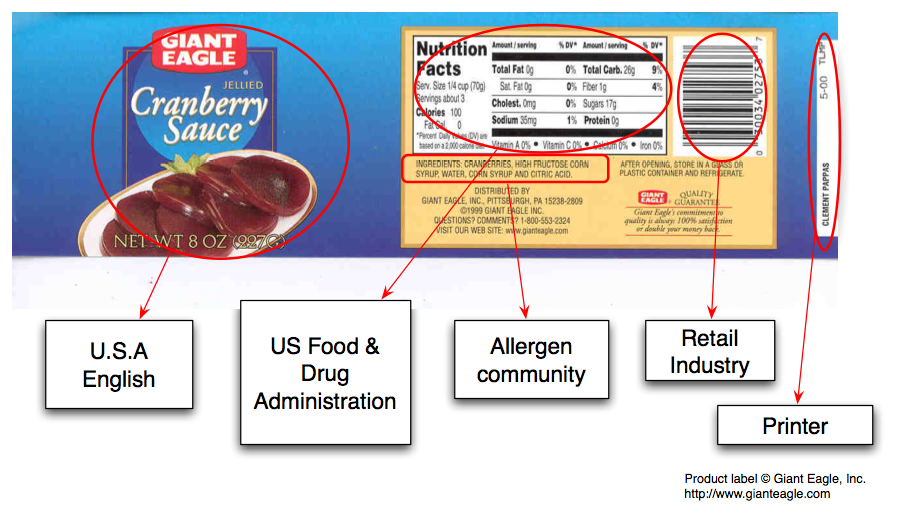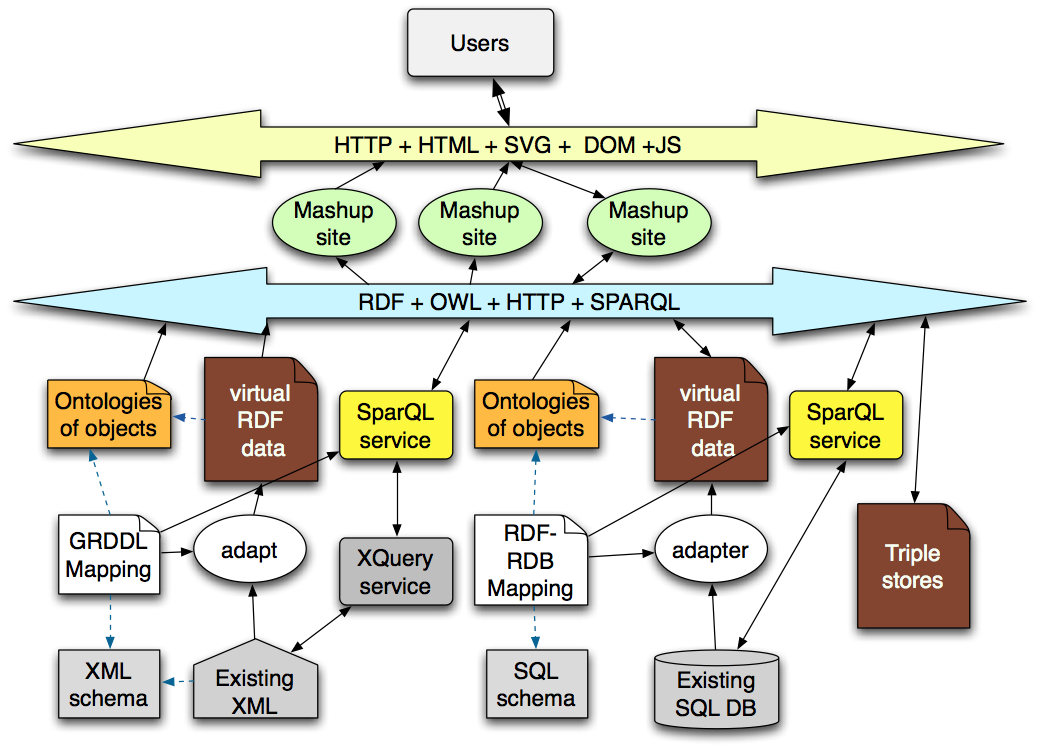This Talk
- The Linked Open Data movement
- Linked data - the essentials
- Communities and ontologies (detailed talk)
- Markets around Linked Open Data
The Linked Open Data Movement
- Most potentially world-changing
- Semantic web done right
- Combination of openness with data + open standards
Linked Data essentials
- Use URIs
- Use HTTP URIs
- Serve useful information using SPARQL, RDF standards
- Mention URIs of related objects
Ontology bits for User Interface
- Labels
- Comments
- Many languages
- For predicates, role nouns: parent, not "has
parent" or "is child of".
Ontology bits for basic inference
Inference - smarter query
- Painter is subproperty of Creator
- Painting is a subclass of Work
- SSN is a Inverse Functional Property
Ontology bits for Validation and Constraining input
- Person is disjoint from Document
- -> allow mistakes to be spotted
- -> allows user input menus to be constrained
Scale Free Economy
Branch: (detailed
talk)
Message mixes vocabulary from many cultures

(Slide: Lalana Kagal)
Applications connected by concepts

For example in biopax

[Diagram: Joanne Luciano, Predictive
MedicineDrug discovery demo using RDF,
Siderian Seamark and Oracle
10g]
- Communities will be of many sizes.

- There will be very many small ones (6.10^9 of size 10^0) and a few
global ones (e.g. W3C Recommendations)
- Kleinberg shows that
fractal (1/f) distribution is optimal under some assumptions
- Swoogle results
for example (right)
- We have less experience when fractal is not constrained to a 2D
surface.
Data mixing: Term by term
| dc:title |
Data Integration and Transparency |
| cc:license |
<http://creativecommons.org/licenses/by-nc/3.0/> |
| dc:creator |
| foaf:name |
Tim Berners-Lee |
| foaf:homepage |
<http://ww.w3.org/People/Berners-Lee> |
| foaf:email |
<mailto:[email protected]> |
|
| tk:event |
| dt:start |
2007-06-12T09:00 |
| dt:end |
2007-06-12T10:00 |
| dt:summary |
W3C-WSRI eGovernment workshop |
| geo:lat |
38.9 |
| geo:long |
-77 |
|
| tk:slides |
<http://www.w3.org/2007/Talks/0618-egov-tbl> |
| tim:slideCount |
12 |
One item may involve data from many ontologies
Data owners should
- Take inventory
- Decide priorities, most likely benefits
- Look for existing ontologies
- Don't change the way data is currently managed
- Set up standard (RDF, SPARQL) portals onto existing data
- Where necessary, adapt or write new ontology bits
Linked Open Data markets
- The market for data
- Markets enabled by data
- Markets for re-hashed data
- Markets for data-handling products
Market for raw data
- Free is good
- For-pay is ok, but so much less enabling
What proportion of documents on the web is for-pay (or ad-funded)?
What motivates you to put stuff on the web?
Markets enabled by data
- Products whose specs, delivery, etc is in LOD
- Automated shopping
- Parts, compatible supplies, clothes,
- Online movies, independent films
- Mashup sites (soccer, etc etc)
Double Bus

Direct use of Linked Data
Allows the user to make their own mashups!
E.g. Tabulator
- Users explored linked data web, finds new data sources
- User finds interesting pattern
- Machine finds all matching patterns in the data out there
- Query across previously unconnected sources
- Analyze the results a la spreadsheet, etc
- Use views for coordinates: timeline, maps
Any arbitrary things on the same map, timeline, etc
Linked Open Data movement
- Linked Data using data standards
- Openness - standard licenses?
- Specific coordination of specific dimensions?
- Place
- Person
- Time
- etc ...
- Lobbying for data sources?
- Government - scientific, census, geographic, planning,
health,...
- Commercial - product specs, catalogs,
- Community - mapping, photos, ...
Challenges
- Continuing the great momentum
- Standards for e.g levels of inference, link following on linked data
clients and servers?
- Federated query; Query service descriptions
- Ultimate human interface to all the data there is
- RDF programming environment
- Balancing diversity and harmony in ontology development
Conclusion
- Linked data very exciting
- Paradigm shift all over again
- You must use the open standards RDF, SPARQL
- Openness (allowing access) is separate question.
























